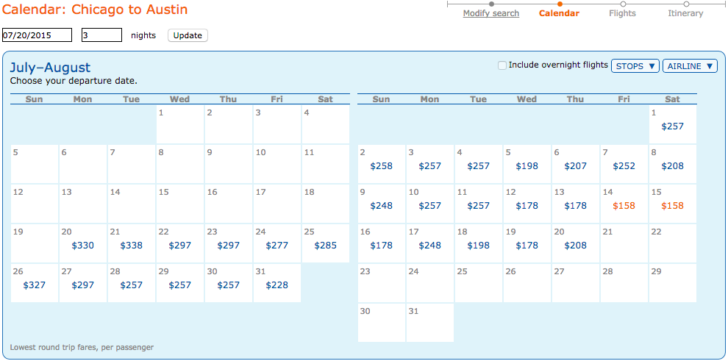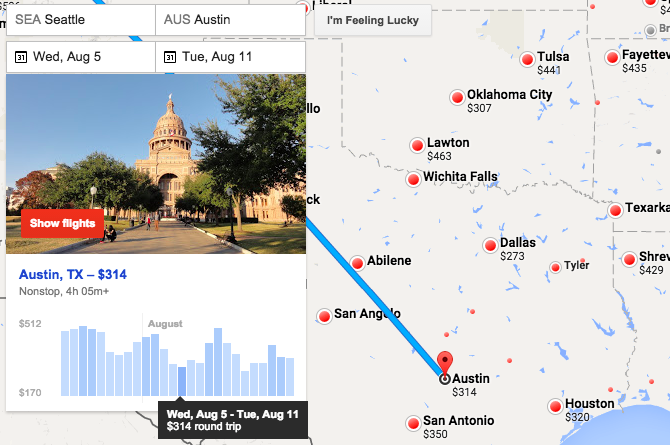I sometimes think the number one reason people read travel blogs is to find ways to book cheap flights. Even if they aren’t the largest expense (hotels are cheaper per night, but probably a larger cost overall), airfare is so variable and inscrutable that some people find booking flights intimidating. These are seven tips that I find are the most helpful when trying to find a good deal. Not all are necessary or will be as easy as others, but almost every method I use is some variation of these.
Still stumped after reading this? Never forget the value of your miles! Sometimes the most expensive flights will have award space available, especially for last-minute travel.
#1: Book 3-6 Weeks before Departure
Everyone wants to know when they should book their flight to save the most money. I don’t like this question, so I’ll get it out of the way first. It has two possible answers.
The answer people want to hear is to book X days before departure. Search on that date and you’ll find the best price. But this is a statistical average. Your flight may be cheaper before or after this date depending on where and when you want to travel. Going to visit Grandma for Christmas? Maybe you want to book six months before. Going to take a quick weekend trip within the same state? Two weeks may be sufficient.

The answer I like to give is that you should check often and book when you find a price you’re happy with. Market economics says the price you’re willing to pay is the price the airline should charge. But there are still some things you can do to pay less. Most cheaper fares are simply unavailable within 2-3 weeks of departure — there may be tons of seats left, but the fares to book them are no longer valid. (Read more about the difference between fares and availability.)
I recommend you start searching 6 weeks before you want to travel to get a sense of what airlines are charging and if fares are going up or down. Make a commitment no later than 3 weeks before your trip.
#2: Fly on Off-peak Dates and Times
Assuming you follow Rule #1, try to be flexible and book travel for off-peak dates and times. These are the times when it’s inconvenient for everyone else to travel, so demand — and prices — are likely to be lower. Business travelers like to fly on Monday, Thursday, and Friday. Leisure travelers like to fly on Friday and Sunday evening.

If you’re willing to travel on Tuesday, Wednesday, or Saturday, you could find lower prices are available. Look for redeye flights for more savings. If you have to travel home on Sunday, leave in the morning. (These may also be the best dates and times to score a free upgrade.)
#3: Browse Anonymously
It’s not clear how important this step is, but it can’t hurt to browse anonymously when you’re booking travel. Some airlines have been known to display higher prices when you search, leave, and come back to search again. The theory is that repeated visits show you really want to fly and aren’t just browsing. A committed traveler is one who’s more likely to pay whatever it takes.
I haven’t faced this problem myself. I usually start my searches by using ITA Matrix or ExpertFlyer, two sites that display published fares without actually selling you the ticket (so in theory they’re less biased). I then make sure I get the same price on the airline website. If web cookies seem to be causing problems, it doesn’t take much effort to open an Incognito window when you’re using Google Chrome (press Shift + Control + N).
#4: Lie about Where You Live
The most important lesson in pricing airfare is that it has nothing to do with operating costs and everything to do with supply and demand. If lots of people want to go from Singapore to Bali, but fewer people want to go from Bali to Singapore, the airline may charge more for the first flight. To go one step further, if people from Singapore and Indonesia are both purchasing tickets on these flights, the airline might charge one group a different price because it thinks those people are more willing to pay. In the example below, customers purchasing tickets in Singapore get a discount, whereas Indonesians (and Americans) pay more. Note that all prices are in USD.


If you pretend to live somewhere else by booking through a foreign website, you might find a lower price for the same ticket. In addition to market forces there are sometimes local regulations that prohibit fuel surcharges or subsidize ticket costs; these are especially common in South America — but be aware you might be asked to show proof of residency. In addition to using local websites, like Ctrip in China, global brands may have individual domains for each country where they operate: Expedia.fr, Expedia.de, and Expedia.ca are all regional variants of Expedia.com.
#5: Lie about Where You’re Going
If supply and demand are so important, it makes sense that you could be able to save money by pretending to fly somewhere else that has lower fares. Two ways to do this are hidden city ticketing and fuel dumping. Note that airlines frown on both practices, so use them at your own risk — repeated abuses could get you kicked out of the frequent flyer program or even banned from the airline.
Hidden city ticketing is a much easier practice for most people and works better for domestic flights. Imagine that high demand for travel from Los Angeles to New York results in expensive fares of $300 or more. But there’s less demand for travel from Los Angeles to Pittsburgh, which is only $200. If the airline lets you route through New York to get there (very possible, since New York is a hub) then you could get off the plane and never continue to Pittsburgh. You just saved $100 on a flight to New York. Skiplagged can help automate the search if you don’t know where to start.

Be aware of the risk that weather delays or other factors could lead the airline to reroute you through a different city. You can’t check bags because they’ll go to your final destination (Pittsburgh). And it only works for one-way travel because, when you miss one segment, all subsequent travel on your itinerary will be cancelled.
Fuel dumping is much more complicated and only applies to international routes that have fuel surcharges — fees that are often $300-500 and can sometimes make up more than half of an international ticket. I discuss fuel dumping in more detail elsewhere.
#6: Mix and Match
You usually don’t have to book a round-trip flight to get the lowest price. In fact, it could hurt you.
Many domestic flights, as well as shorter international flights within the same continent, are often priced as one-way fares. This means you can book them separately or together and pay the same price either way. It’s possible that different airlines have the lowest fare in each direction. Meta search engines like Kayak or Hipmunk are more likely to show you such opportunities and then direct you to the airline’s own website to book, although you’ll have to book each direction separately.
Generally I discourage booking through online travel agencies like Expedia or Orbitz that offer to book the whole itinerary in a single transaction. If something goes wrong with your ticket, the airline and the OTA start pointing fingers. But they can still be a useful way to search and then book elsewhere.
I already hinted that many long-haul international flights are an exception to this rule. If you want to go from Los Angeles to London, it’s almost certainly cheaper to book a round-trip flight. In fact, round-trip may be cheaper than a single one-way flight. If you only need to go one-way, consider booking round-trip and “forgetting” to go home.
#7: Book Now and Change Later
Finally, take advantage of all the ways to be flexible with your travel plans even when making so-called “non-refundable” reservations. Such rules usually don’t prevent you from making same day changes or standby requests on the day of travel, and if you have elite status any fees are typically waived. Each airline has different rules that determine if you can change to an earlier flight, a later flight, or even eliminate inconvenient connections. I’ve sometimes used same-day changes to improve my chances at an upgrade.
Another approach is to change tickets further in advance. This is often possible with award tickets, especially since some of the best award seats in premium cabins on direct flights may not become available until 1-2 weeks before departure. Many airlines charge the same number of miles regardless of when you book, and if you have elite status it’s possible most change fees will be waived. Some carriers, such as Southwest Airlines and Alaska Airlines, also allow you to cancel and rebook paid fares before departure without penalty.
Just remember that such strategies are not guaranteed. If you really can’t be satisfied with the original itinerary, maybe you shouldn’t book it. You may find that there are no seats left on the preferred flight, or there may be other people ahead of you in the standby queue. That could leave you paying a lot more to cancel and rebook your ticket at the last minute.




